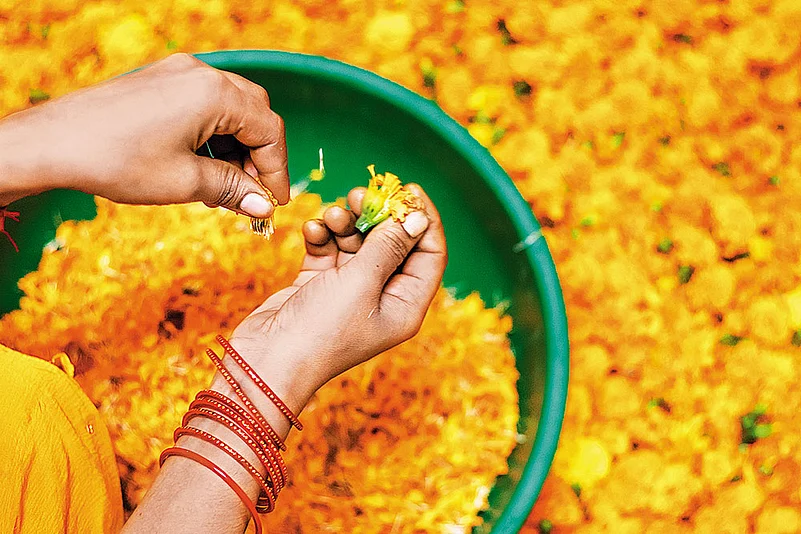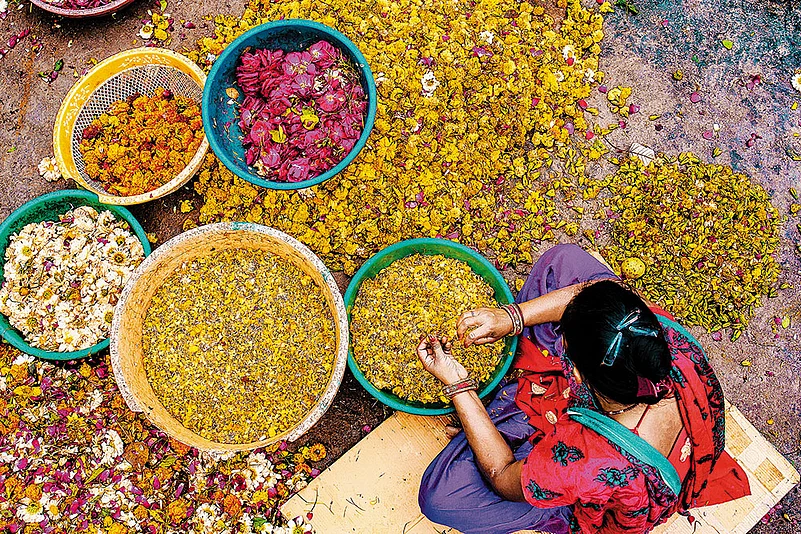On the banks of the Ganges in the heart of Uttar Pradesh stands the city of Kanpur. Once upon a time, it was called the ‘Manchester of the East’. It housed textile mills, a vast leather industry and chemical factories. Times have changed. The industrial hub is in ruins. And from the ruins has blossomed an idea: Phool.
The mind behind the idea is that of Ankit Agarwal, a 35-year-old computer engineer from the city. On a cold January morning in 2015, Agarwal was strolling on the banks of the Ganges when he noticed the amount of flower waste that had gathered. A cursory bit of research told him that nearly 8mn tonne flower waste ends up in the river every year. And Agarwal couldn’t ignore the problem.
Making the Best of Waste
At the time, Agarwal was working at a consumer software company called Symantec as an automation scientist. His interest in sustainable business had sparked during his research on waste tyre pyrolysis. In time, Agarwal found a comrade in Prateek Kumar. Kumar, 38, was involved in tackling the environmental challenge of waste tyres while working at Apollo Tyres.

United by a shared purpose, the two began their research. One-and-a-half years later, the efforts culminated in Phool.
Phool collects waste flowers thrown into the Ganges and turns them into a range of products including incense sticks, scented candles, essential oils, diffusers and candleholders. The start-up employs 347 women.
It Blooms, But Does it Boom?
Starting a business in Kanpur comes with its challenges. Agarwal says many ridiculed the idea when he and Kumar decided to set up their base in the city, away from Tier-I cities that attract start-up capital. When they started out, they had an investment of only Rs 72,000. They managed to scale only when they received support from Indian Institute of Technology Kanpur’s start-up incubation and innovation centre.
But now, Phool has generated significant business interest. Its major investors include Indian Angels Network (IAN), Sixth Sense Ventures and Draper Richards Kaplan Foundation. “Phool solves a real problem,” says Padmaja Ruparel, co-founder of IAN. She adds, “It helps clean rivers by collecting temple waste and then leveraging technology and biotechnology to convert the waste into high-value products.”

In financial year 2023, Phool reported a revenue of Rs 28.58 crore. Its expenses were Rs 32.14 crore, resulting in a net loss of Rs 3.55 crore, according to data platform PrivateCircle. Despite the loss, the company maintained a net cash flow from operations of Rs 12.43 crore.
Agarwal says Phool has been able to surpass challenges by focusing on becoming a mainstream brand through marketing on the basis of a sense of nostalgia for the Indian heartland. He says that from the very beginning Phool positioned its products at the premium end, pricing the incense sticks from Rs 145–165.
“Industry veterans were sceptical, dismissing it as a Rs 10 product with no market potential. Today we are among the fastest-growing online incense brands, driving a market shift. Traditionally, incense sticks were charcoal based. We pioneered an all-natural alternative,” he adds.
The company is also in the process of expanding beyond Kanpur. Phool founders say they have signed memorandums of understanding with the Ram temple in Ayodhya, the Kashi Vishwanath temple in Varanasi and the Jagannath temple in Puri.
Sajju Jain, an adviser to start-ups, says scaling the supply chain is critical for Phool’s growth. This requires a dedicated team to manage expanding partnerships with temples and other stakeholders, he says.
A Challenge to Leather
Agarwal and Kumar are now plotting a challenge to leather with vegan leather, or what they call ‘fleather’. Fleather is made by repurposing flower waste. The founders came upon the idea when they noticed a fibrous layer forming on waste flowers at their factory.
“Our approach aims to replace animal leather with leather made from temple flowers,” says Agarwal. He is hopeful that Phool may be able to disrupt the $550bn global leather business with this alternative.












